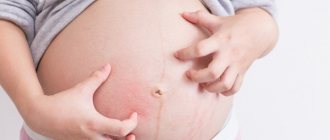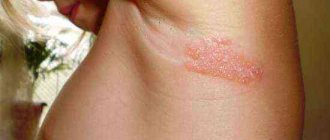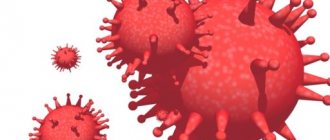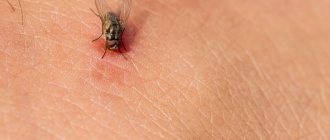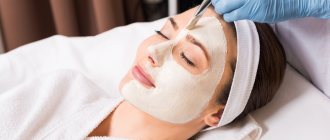Allergies during pregnancy: the effect of allergies on the fetus
25.05.2021
Epidemiological data show that 15-30% of women of childbearing age suffer from allergic diseases. Allergies often worsen during pregnancy and can complicate pregnancy.
Allergies during pregnancy
Allergies can be a group of disease symptoms caused by contact with environmental factors that do not cause allergic reactions . Exposure to external factors, called allergens , activates the immune mechanisms of the allergic person. After this, the immune system begins to stimulate the body's cells to release various substances that cause inflammation.
Allergens can be divided into:
- inhaled;
- food;
- contact.
Depending on which allergen is the source of sensitization, different symptoms will appear. Inhaled allergens mainly cause respiratory diseases, and contact allergens cause skin reactions.
Allergies may worsen during pregnancy . This mainly applies to allergic rhinitis and asthma . Moreover, some allergic diseases appear for the first time during pregnancy . One of them is atopic dermatitis , which is the most common dermatosis among pregnant women.
The effect of allergies on the fetus
Allergies can negatively affect fetal development.
The following allergic diseases can affect the course and outcome of pregnancy:
- asthma;
- allergic rhinitis;
- conjunctivitis;
- hives;
- anaphylaxis;
- food allergy;
- drug allergy .
Women with asthma are primarily at increased risk of complications during pregnancy and childbirth . Experts estimate that up to 10% of pregnant women suffer from asthma . Research into asthma during pregnancy suggests it can slow down a baby's development. It can also lead to premature birth and low birth weight of the fetus. Because of the above complications, pharmacotherapy during pregnancy will be much less of a threat to the fetus than untreated asthma .
Allergy medications during pregnancy
During pregnancy , many changes occur in a woman's body. They concern almost all systems, especially the cardiovascular, respiratory, urinary, digestive and endocrine systems. The body of a pregnant woman is preparing to create appropriate conditions for the development of the fetus.
Due to changes in the functions of many organs and direct effects on the fetus, a pregnant woman needs to be especially careful when taking medications. Moreover, the annotations of most medications indicate that they are contraindicated in pregnant women.
Most allergic diseases are treated with antihistamines, which block the physiological effects of histamine. Histamine is the main mediator of allergic reactions . Antihistamines that are safe for pregnant women include: cetirizine, loratadine, clemastine, cyproheptadine and diphenhydramine.
Pregnant women should absolutely not take:
- antazolines;
- fexofenadine;
- hydroxyzine;
- promethazine;
- ketotifen;
- Levoceterizine.
Women with asthma may take bronchodilators and anti-inflammatory drugs during pregnancy Safe drugs include sympathomimetics - mainly salbutamol, fenoterol, formoterol, terbutaline and inhaled glucocorticosteroids: budesonide and beclomethasone. Oral corticosteroids are not recommended during pregnancy .
In the case of allergic rhinitis , in addition to antihistamines, pregnant women can use nasal corticosteroids, mainly budesonide, and, if necessary, beclomethasone and fluticasone, since there are still no studies confirming their harm during pregnancy .
For atopic dermatitis during pregnancy , topical emollients and antipruritic drugs are recommended. If their use does not bring improvement, general therapy with antihistamines is prescribed.
Home remedies for allergies during pregnancy
In addition to pharmacological agents, pregnant women with allergic rhinitis can use inhalations with sea water or 0.9% saline solution. There are many herbs that help relieve skin and intestinal allergy , but a pregnant woman should consult her doctor .
Published in Allergology Premium Clinic
Forms and stages of atopic dermatitis
The critical periods of pregnancy are considered to be the 1st and 3rd trimester. During this period, atopic dermatitis can be severe. In other cases, everything goes smoothly.
Treatment of atopic dermatitis during pregnancy depends on the severity:
- Light form. The rashes are mild, accompanied by swelling, and have a pinkish tint. There is no peeling; skin itching occurs periodically.
- Medium shape. All symptoms intensify, the rash spreads throughout the body: on the face, back, stomach, inner thighs. Another characteristic sign is darkening of the skin around the eyes.
- Severe form. Due to severe itching, there is a possibility of nervous breakdowns and sleep problems. The skin at the site of the rash becomes swollen, peels, and becomes covered with erosions and pustules.
Viral infection
Not only allergies can cause breast rashes during pregnancy. If this is the case, then you need to be treated immediately, since most diseases are caused by infections that are dangerous for the unborn baby - the development of congenital pathologies is possible, and in some cases, the death of the fetus in the womb.
Such ailments include:
- measles;
- rubella;
- dermatitis;
- chicken pox.
The treatment is complex and long, and it is not a fact that it will preserve the baby’s health. The sooner therapeutic measures begin, the better.
Cosmetics La Cree - an assistant to the expectant mother
The La-Cri series is a non-hormonal anti-inflammatory product with a natural composition for the care of skin prone to itching. They are sold in pharmacies and do not contain hormones, fragrances, dyes, silicones and parabens.
The complex composition, including natural components, effectively affects all manifestations of skin inflammation: redness, itching, irritation and peeling. Thanks to its safe composition, La-Cri products are approved for use when hands itch during pregnancy.
Clinical researches
The effectiveness, safety and tolerability of La-Cri products have been clinically proven. The products are recommended by the Union of Pediatricians of Russia. During clinical studies, specialists were able to record that the La-Cri cleansing gel:
- gently cleanses the skin;
- relieves redness and itching;
- restores and nourishes the skin.
Cream for dry skin "La-Cri" eliminates dryness and flaking, retains the skin's own moisture, and also protects it from wind and cold.
Lip balm La Cree:
- relieves the feeling of discomfort and dryness;
- restores dry and cracked lips;
- moisturizes and protects the skin from wind and cold.
Sources:
- Sukolin Gennady Ivanovich, Illustrated clinical dermatology. Brief alphabetical reference book, Lux Print publishing house, 2010.
- Schneiderman Paul, Grossman Mark, Differential diagnosis in dermatology. Atlas, Binom, 2022.
- Reken Martin, Schaller Martin, Sattler Elke, Burgdorf Walter, Atlas of Dermatology, MEDpress-inform, 2022.
Photos of eczema
Photo album on the disease
Symptoms
It would seem that there is only one symptom - a rash. But this rash in different cases can differ in color (from pale pink to bright red) and in size (from a millimeter to 10 centimeters or more). Such features allow us to draw primary conclusions about the cause of the disease and exclude some non-allergenic options, for example, dermatitis or measles.
In addition to rashes, the disease in question is characterized by:
- slight increase in temperature;
- malaise;
- irritability;
- peeling of the skin;
- itching;
- sometimes there is pain;
- rhinitis and conjunctivitis;
- general weakness.
In almost all cases, a woman becomes irritable if she has to endure unpleasant symptoms. This may affect the child’s nervous system, but if the girl’s general health is normal, then the danger will pass by.
Formations like the appearance of a rash
Visually, the manifestations of the rash on the body of pregnant women are no different from its manifestations on the body of an ordinary person. These are all the same: spots, blisters, nodules (papules), bumps, and so on. These are usually manifestations of the primary rash.
The above formations, during the development of the disease, dry out and form dried crusts of inflamed skin, cracks and scars form. As the disease progresses, different types of rashes are accompanied by scratching. Accordingly, if you scratch the rash, the skin is broken, the scratching gets infected, forming pustules, which are much more difficult to get rid of.
Exacerbation of the disease
Conceiving a child is a very significant event for the body. As soon as the egg is fertilized, the restructuring of all organs and systems begins. The immune system does not stand aside either, the malfunction of which becomes the cause of allergies.
If previously there were no negative reactions, or they occurred to a limited range of irritants, now anything can act as allergens leading to a rash on the chest during pregnancy:
- food;
- medicines;
- cosmetical tools;
- jewelry (extremely rare);
- sunlight;
- pet hair and excretions;
- fabric (most often synthetic);
- household chemicals.
The reason lies in the fact that during pregnancy, even a minimal dose of the pathogen leads to the release of histamine, a hormone responsible for the body’s protective reaction and leading to the development of allergies.
Prevention
The best way to prevent chest rashes is to work on your immune system. This should be taken into account when planning pregnancy.
It is important to pay attention to the following nuances:
- healthy diet;
- more vitamins (fruits, vegetables, but not citrus fruits - they are powerful allergens);
- walks in the open air;
- a lot of positive;
- less stress.
With this regimen, the immune system will not fail during pregnancy, so you don’t have to worry about allergies. Even if the disease manifests itself, it will be much easier to fight it.
